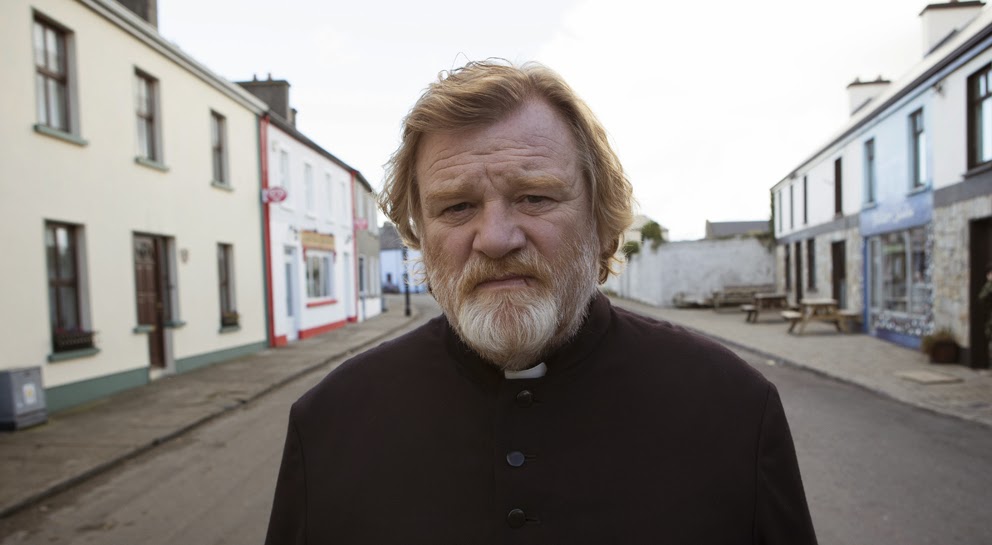When Brendan Gleeson gets together with John Michael
McDonagh, magical things happen. The two first teamed up in 2011 for the black
comedy, The Guard, which, though it gets dark when it needs
to, showcases Gleeson’s easy charm, humor and ability to absolutely take
control of the frame. He’s proven time and time again that he’s one of the best
and most underappreciated character actors working today. Their latest
collaboration, Calvary, takes a different approach than
their last endeavor, but is no less impressive, illustrating again that Gleeson
is equally adept in the lead of this character study as in any supporting
roles.
Father James Lavelle (Gleeson) is parish priest for a small
town on the Irish coast. During a confession, one of his flock reveals that he
was sexually abused by another priest as a child and that he plans to kill
Father James in one week, strictly because he is a good priest, and a good man,
and this will be more damning and damaging to the Catholic Church that killing
the offender. Though James knows the man who threatens him, he refuses to go to
the police or do anything to protect himself, relying on his faith in both a
higher power and humanity.
This is indicative of Father James—steady, firm, committed
in his beliefs. The title is a reference to the hill where Christ was
crucified, and James attempts to live a similar life, ministering to the weak
and repentant, refraining from judgment, doing what he thinks is right
regardless of the consequences. As he says, “there is too much talk about sins,
to be honest, not enough about virtue.” It is the very fact that he is beyond
reproach that winds up making him a target, and at the same time won’t allow
him to act for his own benefit and self-preservation. Gleeson is incredible in
this role and carries the entire film on his broad shoulders.
As the week counts down, Father James goes about his
business and as one meets the denizens of his parish, one tries to unravel the
mystery identity of the unseen killer. Populated by unusual characters, Fr.
James minsters in his usual manner, leaving the viewer to wonder who wants him
dead. A local, self-destructive millionaire (Dylan Moran) admits his sins. On
an isolated island off the coast, an elderly writer (M. Emmett Walsh)
contemplates suicide, the one unforgivable sin. A brazenly atheistic doctor
(Aidan Gillen) recounts a procedure gone horribly wrong. Everywhere he turns,
Fr. James faces tests and finds people who need him.
Everyone in town is wounded and broken, the idyllic surface
masking an undercurrent of domestic abuse, secrets and corruption. Despite the
fact that everything couldn’t be more wrong, everyone walks around pretending
that they’re okay. Fr. James has a distant, troubled relationship with his
estranged daughter (Kelly Reilly), who is her own brand of self-destructive.
Through these lies the characters tell themselves, McDonagh creates a subtext
of stories and storytelling—after all, what are lies if not the narratives we
tell others and ourselves?
While Calvary is, overall, more on the
serious side than The Guard, that isn’t to say the film
isn’t without a sense of humor. Fr. James may be a man of faith, but he is
personable, warm and sarcastic as all hell. Full of sardonic wit and sharp
dialogue, the film even takes an occasional turn into crude and juvenile
territory—when was the last time you saw a movie where two priests have an
earnest discussion of felching? This is a dark humor that attempts to shine a
light on that shadowy region occupied simultaneously by both comedy and
tragedy, between ease and discomfort.
As great at Calvary can be—especially the
gallows humor that illustrates the line between life and death, of which there
are constant reminders, and the character work—the story falters some during
the middle act. It becomes too much of a mystery. Gleeson is magnetic to watch,
but there numerous characters, like an affected hustler working the local
circuit (Owen Sharpe), a husband with a violent streak, and more that are never
fully fleshed out and exist primarily to keep you guessing about the identity
of the unknown confessor. The mystery element itself is something of a red
herring, designed to distract from the core of the characters and story.
Calvary is a philosophical and
existential examination of one man pondering the nature of his faith.
Unpretentious and precise, full of stunning images of the Irish coast,
McDonagh’s latest is despondent and optimistic, hopeful and resigned, and most
of all a satisfying, self-referential and rich.


No comments:
Post a Comment